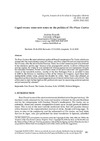Identificador persistente para citar o vincular este elemento:
https://accedacris.ulpgc.es/jspui/handle/10553/54000
| Campo DC | Valor | idioma |
|---|---|---|
| dc.contributor.author | Rinaldi, Andrea | en_US |
| dc.date.accessioned | 2019-02-05T11:07:47Z | - |
| dc.date.available | 2019-02-05T11:07:47Z | - |
| dc.date.issued | 2019 | en_US |
| dc.identifier.issn | 1133-598X | en_US |
| dc.identifier.uri | https://accedacris.ulpgc.es/handle/10553/54000 | - |
| dc.description.abstract | The Pisan Cantos is the most notorious section of Pound’s masterpiece The Cantos, which was named after the concentration camp of Coltano, near Pisa, where Pound was imprisoned by the US army after the fall of Italian Fascism. There, the exiled American poet was detained in the infamous ‘gorilla cage’ because of his propagandist activity in favour of Mussolini and his regime, for which he was indicted for treason against his own homeland. Despite his inhuman treatment, Pound wrote there some of the most renowned and appreciated verses of the twentieth century, worthy of the first Bollingen Prize as awarded to him in 1949 by the Fellows in American Letters of the Library of Congress. Apart from their undisputable artistic value, praised for decades by critics, these verses also attained an important political function, inspiring generations of fascist intellectuals and activists. This article aims to shed further light on this political relevance by uncovering archival material not yet analysed by scholars. | en_US |
| dc.language | eng | en_US |
| dc.relation.ispartof | Vegueta: Anuario de la Facultad de Geografía e Historia | en_US |
| dc.source | Vegueta: Anuario de la Facultad de Geografía e Historia [eISSN: 2341-1112], n. 19, p. 381-401 | en_US |
| dc.subject | 55 Historia | en_US |
| dc.subject.other | Ezra Pound | en_US |
| dc.subject.other | The Cantos | en_US |
| dc.subject.other | Fascism | en_US |
| dc.subject.other | Exile | en_US |
| dc.subject.other | WWMII | en_US |
| dc.subject.other | Political religion | en_US |
| dc.title | Caged verses: some new notes on the politics of The Pisan Cantos | en_US |
| dc.type | info:eu-repo/semantics/article | es |
| dc.type | Article | es |
| dc.identifier.eissn | 2341-1112 | - |
| dc.investigacion | Artes y Humanidades | en_US |
| dc.type2 | Artículo | en_US |
| dc.identifier.ulpgc | Sí | es |
| dc.description.esci | ESCI | |
| dc.description.fecytq | Q3 | |
| dc.description.fecytpuntuacion | 35,24 | |
| dc.description.dialnetimpact | 0,0 | |
| dc.description.dialnetq | Q2 | |
| dc.description.dialnetd | D3 | |
| dc.description.erihplus | ERIH PLUS | |
| item.fulltext | Con texto completo | - |
| item.grantfulltext | open | - |
| Colección: | Artículos | |
Visitas
83
actualizado el 10-ene-2026
Descargas
67
actualizado el 10-ene-2026
Google ScholarTM
Verifica
Comparte
Exporta metadatos
Los elementos en ULPGC accedaCRIS están protegidos por derechos de autor con todos los derechos reservados, a menos que se indique lo contrario.
